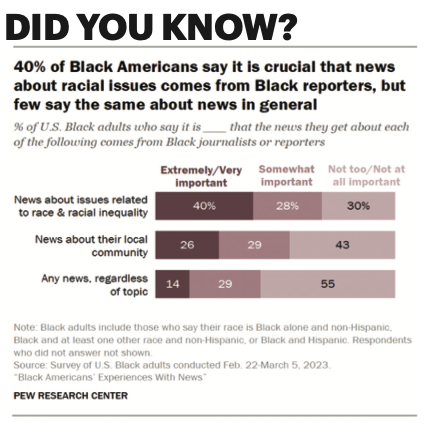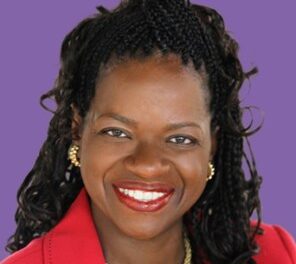By Zoie Roberson, Speakin’ Out News staff writer (courtesy photos)

ANCHORS AWAY’: (LEFT – RIGHT) Margo Gray of WAFF 48 and Demetria Green of WAAY 31, two esteemed news personalities illuminating the Tennessee Valley with a dedication and distinction.
HUNTSVILLE, AL – – In the dynamic landscape of news media, the voices and representation of Black women have emerged as pivotal and transformative forces, playing instrumental roles in telling community stories and driving change. As we delve into the role of Black women in the news media, we aim to acknowledge their contributions and recognize the challenges they face in the industry. We also thank the phenomenal news anchors, Margo Gray of WAFF 48 News and Demetria Green of WAAY 31 News, for allowing us to share their backgrounds and stories.

STEPPING INTO THE NEWS INDUSTRY
Gray and Green, with over a decade of industry experience, are prominent figures in North Alabama. Both started their journeys with a shared passion for news, sparked by their early fascination with television news.
Demetria Green: “I started laying out a game plan of how to get into this [news] industry because I really liked it. I was one of those nerds who was always in front of the TV trying to find out what was going on and then try to relate it to my friends. I would always bring it down – they’d call it ‘hood news,’ which is like layman’s terms – to explain why they should be interested. So, that started from my early days in high school and college.’” Green’s serious commitment to her news industry career began after she graduated and left corporate America. She eagerly moved back to her parent’s home in Chicago and embraced an unpaid internship, driven by her passion for journalism. In her own words, “This is something I wanted to do.” Green is grateful for the opportunity, as it expanded her network and provided guidance from experienced industry professionals, including Emmy award-winning journalists. Their willingness to help and mentor her, despite the competitive nature of the industry, left a profound impact on her.
Margo Gray: Gray, an immigrant from Jamaica raised in a single-mother household, knew her calling since youth. Given her mother’s two jobs, their limited time together often involved watching Jeopardy or the news. During the 1980s-1990s, a time when influential Black journalists were rising in the news- media, Gray felt inspired to commit her life to a career in the industry. Her admiration for figures like Dwight Lauderdale, one of the first Black males in local news, solidified her determination to follow this path. Throughout her educational journey, from elementary school to college, Gray diligently prepared herself for a successful career in journalism. “In TV news, your résumé isn’t on paper; it’s on video. In college, I compiled résumé tapes and sent them to a hundred small market stations. Only three called me back. I started as a part-time reporter in Wilmington, North Carolina. I made $18,000 a year. But it’s not about the pay; it’s about the pas sion. I was one of two hired for the position, but my counterpart never showed up on the first day, so I was hired full-time,” Gray shared. From there, Gray progressed through various contracts, climbing the ranks. Her journey eventually led her to Huntsville, Alabama, where she settled down with her family.
BEING A BLACK WOMAN IN THE NEWS INDUSTRY
The challenges can be immense in the news industry, especially for Black women. Gray and Green both shared their experiences with prejudice and discrimination.
Margo Gray: Gray high-lighted the challenges faced during the pandemic, saying, “In the pandemic, in particular, we [Black women] were straight up attacked. I don’t ‘say’ anything. It’s always what doctors say, the school board says, or city leaders say. I don’t have an opinion.” She went on to recount dealing with unfounded assumptions: “They could hide behind their keyboards and say all these nasty things. I actually had to have someone banned from emailing me because with the mere mention of Trump’s name and being Black, they assume I’m a Democrat and taking sides. One day in particular, I never even spoke about former president Trump–it never even exited my mouth, but then I got an email saying, ‘We see you smirking every time you talk about President Trump.”
Demetria Green: Green also shared her experiences, stating, “It has been kind of rough.” She recalls, “When I did get my first job on air, it was in Dothan, Alabama. They were like, ‘alright, here’s your assignment, go do it.’ So, I decided at that point, I’m going to work harder, I’m going to work longer hours because I’m going to make this dream a reality.” Despite her hard work, Green’s dreams of becoming an anchor were nearly shattered when her boss said, “she did not feel the audience was ready for a person who looked like me to sit at the desk,” said Demetria. This was disheartening and heartbreaking, but Green didn’t give up. She persevered, and soon after, a new opportunity came her way when a different person in charge recognized her talent and potential, telling her, “Hey, Demetria, we like you–do you want this opportunity?”
THE EFFECTS OF MORE BLACK REPRESENTATION IN THE NEWS MEDIA
As the discussion shifted, the conversation explored how increased representation of Black women in the news media can impact the news industry and the wider community in North Alabama.
Demetria Green: Green noted that her experiences in Philadelphia, where
Black women were visible on every news station, were empowering, saying, “It was very empowering to see us of all different shades, doing our thing.” However, upon returning to Alabama, Green noticed a lack of representation, particularly in the morning news, which left a void in Black and Brown representation. Yet, her presence has started to make a difference. People have reached out, expressing their appreciation for her return and the opportunity to share their stories. Green stressed that her role is not just about her but about providing a platform for others who look like her and share their unique perspectives, which adds depth and context to community stories. This underscores the importance of diverse representation in the news media.
Margo Gray: Gray also serves as a trusted news anchor in the Black community, dedicated to sharing their stories and representing their perspectives. One story she covered involved the Jones family in Huntsville, who seek compensation for land they believe was stolen from them, now part of the UAH campus and other developed areas. Gray explained, “The Jones family felt comfortable to sit down with me and share their struggles. It was a piece that I did on the fact that they believed wholeheartedly that their land was stolen from them.” This situation echoes the historical land theft suffered by many Black families in the 1950s and 1960s. The Jones family alleges that their land was unjustly taken from them through the use of forged court documents, and they are seeking compensation. Gray’s reporting exposed this situation, shedding light on the family’s history and underlining the imperative for justice.
The power of the news media goes beyond mere information, as it guides public focus to critical issues, fostering change and championing justice. In this symbiotic relationship between the news media and the pursuit of a just society, the pen truly proves mightier than the sword, illuminating a path to a more informed and equitable society.











